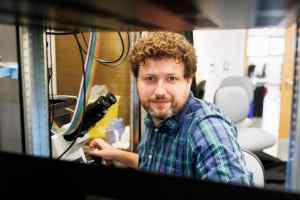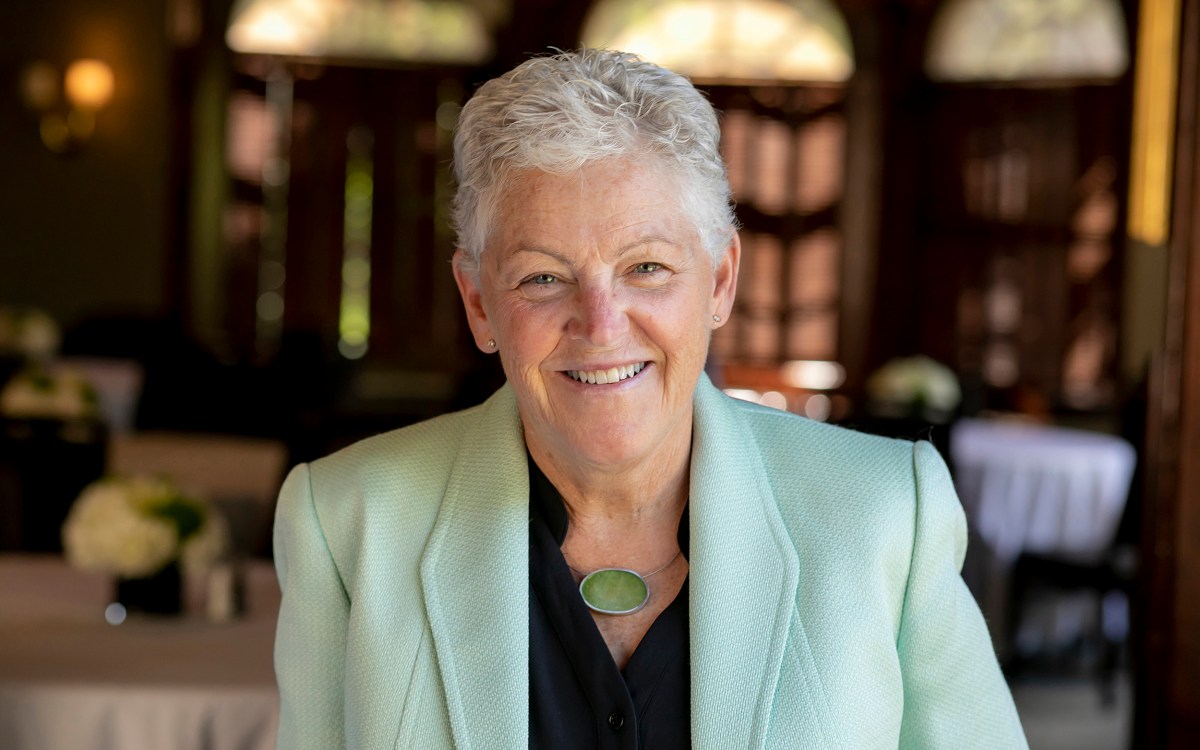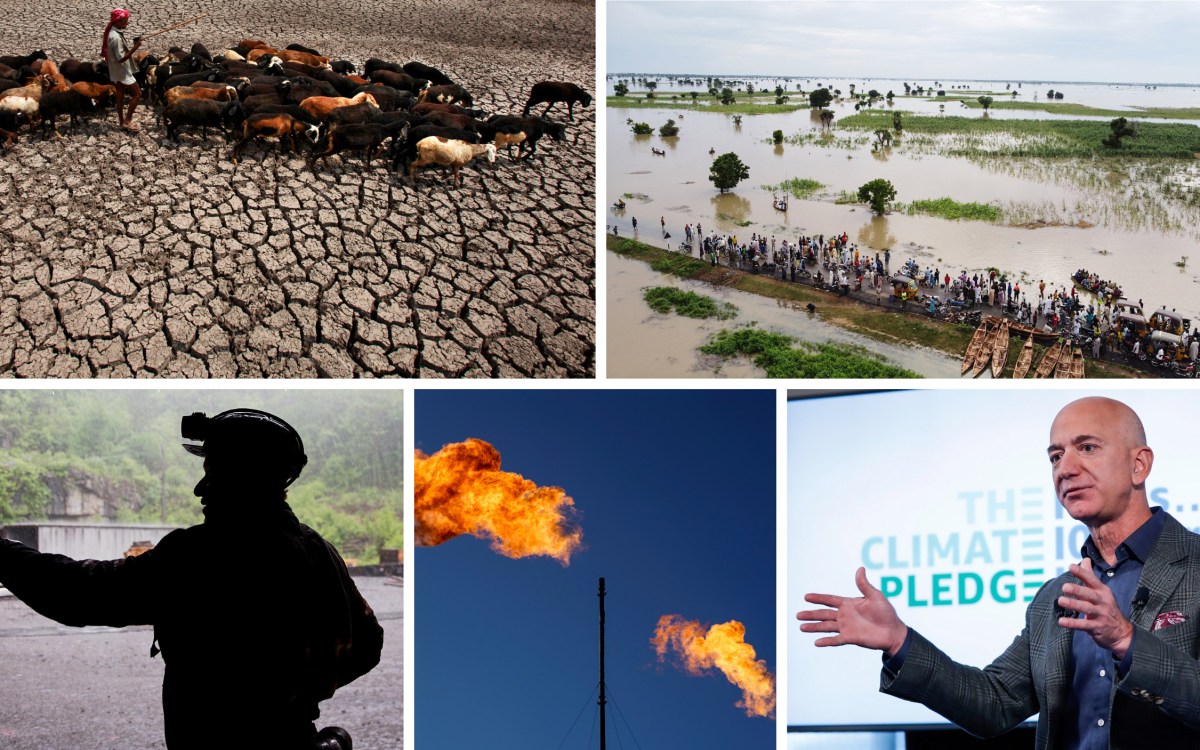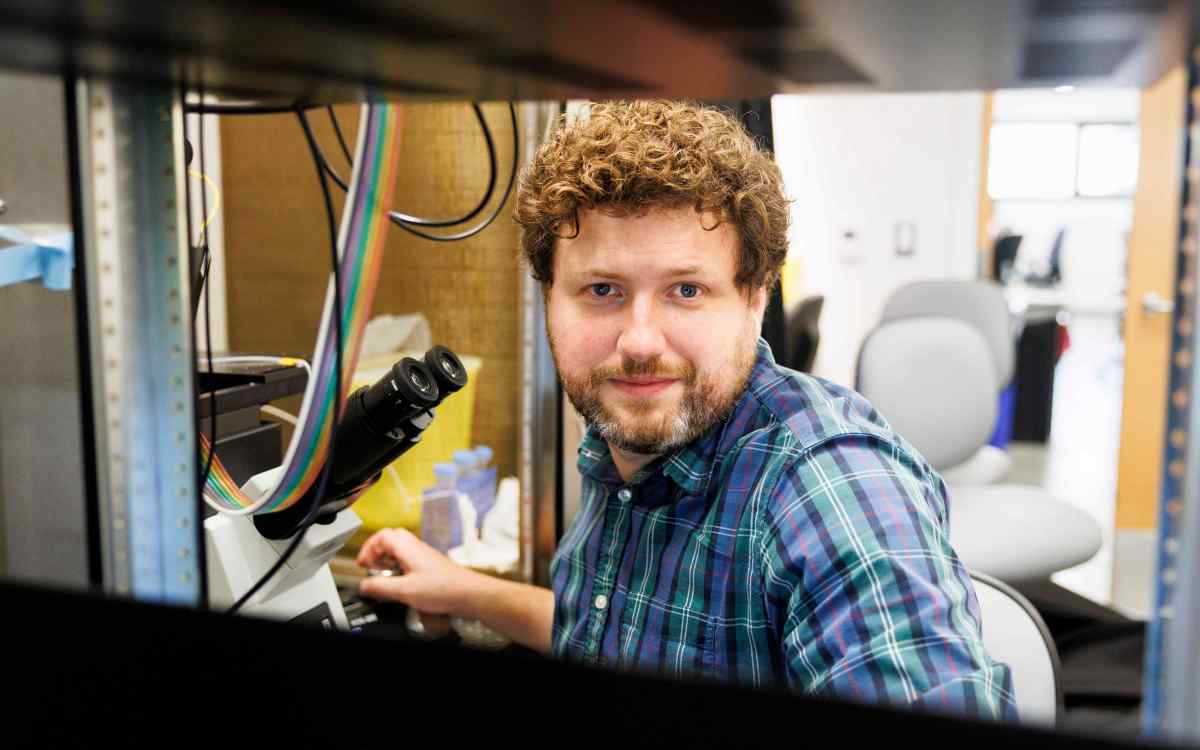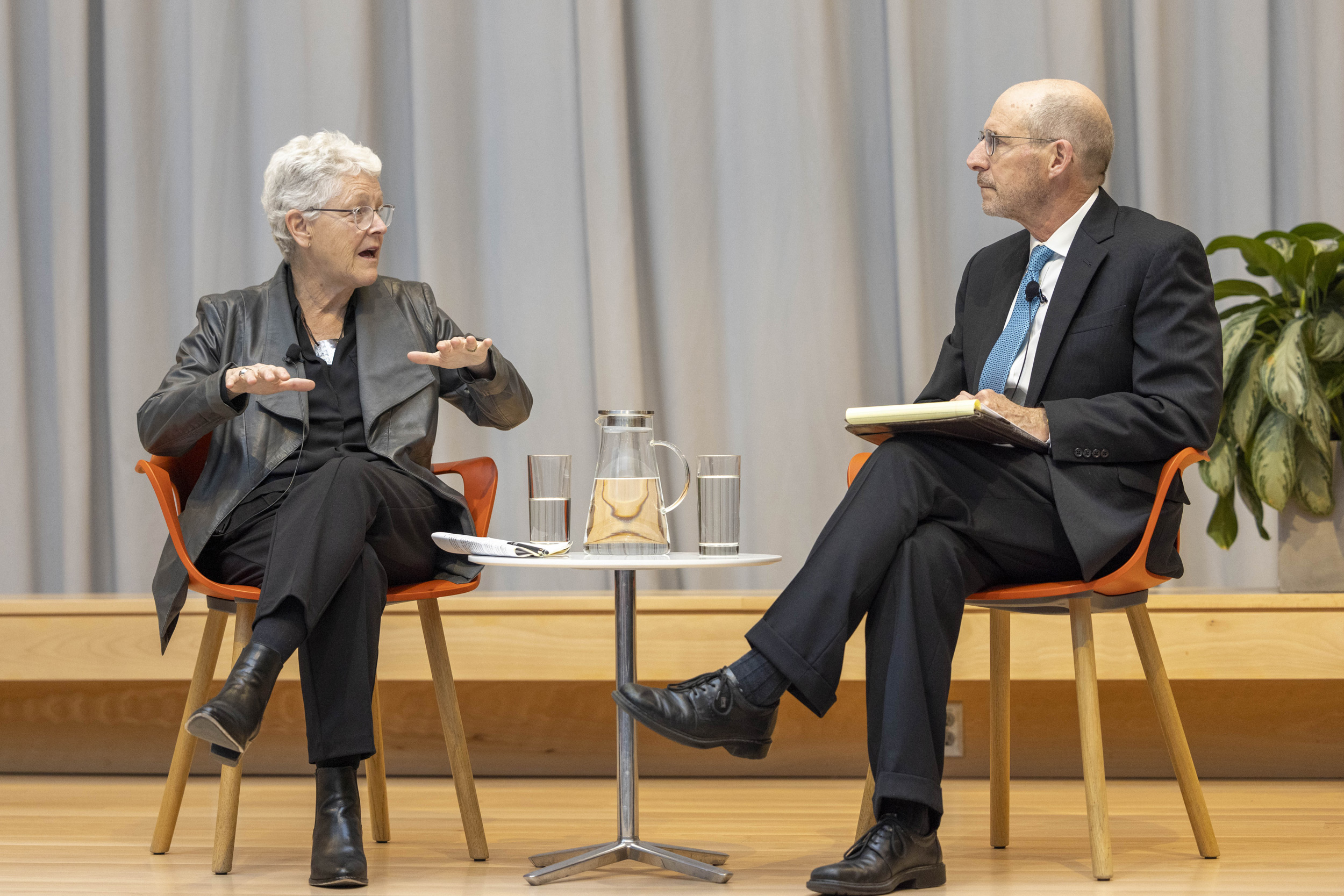
“This is a time for us to be confident that the United States is where it should have been a long time ago, but we are where we have to be right now,” Gina McCarthy told James Stock, Harvard’s Vice Provost for Climate and Sustainability.
Photo by Scott Eisen
U.S. clean energy transition soon ‘to be on steroids’
Former Biden climate adviser McCarthy brings insider’s view of status of battle against warming to Smith Center
Former White House climate adviser Gina McCarthy brought her characteristic brand of climate optimism and pragmatism — tinged with humor and topped with a call to action — to Harvard on Wednesday, saying recent federal action has put climate progress “on solid ground” in states led by Republicans as well as Democrats.
McCarthy served as the first national climate adviser before leaving the White House in September. She said steps taken during the administration’s first two years, including climate-related features in the Infrastructure Investment and Jobs Act, the CHIPS and Science Act, and the back-from-the-dead Inflation Reduction Act, have put the nation on track to achieve significant reductions in emissions of warming gases.
“They’re all on very solid ground in both blue and red states,” McCarthy said of the initiatives. “It is remarkable the changes that we’re seeing on the ground, both in terms of people’s hopefulness for the future, the investments, the changes that are happening in communities and that we anticipate to happen. And I could argue that the clean energy transition is soon going to be on steroids.”
McCarthy joked that the coming changes may bring inconveniences, some particularly familiar to the nation’s drivers.
“That mostly means that all of our roads are going to be dug up, so you’re going to have to be patient about not being able to get anywhere,” McCarthy said. “Buildings are going to be built; good things are going to happen. So be patient. It’s exciting. This is a time for us to be confident that the United States is where it should have been a long time ago, but we are where we have to be right now.”
McCarthy, a former climate adviser to Massachusetts’ governors, former administrator of the federal Environmental Protection Agency, and former professor of the practice of public health at the Harvard T.H. Chan School of Public Health, delivered the Weatherhead Center for International Affairs’ Warren and Anita Manshel Lecture in American Foreign Policy on Wednesday. She was introduced by Weatherhead Director Melani Cammett and, after prepared remarks, had a conversation with Harvard Vice Provost for Climate and Sustainability James Stock and took audience questions.
“It is a moment of hope and certainty. But it still requires that we fight like hell every single day to say, ‘This is good, but what’s next? …’”
Gina McCarthy
Cammett described McCarthy as one of the nation’s most respected voices on climate, the environment, and public health, and credited her leadership in the White House for recent progress in those areas.
“McCarthy’s leadership led to the most aggressive action on climate in U.S. history,” Cammett said at the Smith Campus Center event. “Her commitment to bold action … restored U.S. climate leadership on a global scale and put a new U.S. national target to cut greenhouse gas emissions by 2030.”
In her talk, McCarthy detailed why climate-friendly incentives in recent federal legislation have proved so attractive to states on both political sides. For example, she said White House expectations were fairly low when the U.S. Department of Transportation requested states submit proposals for electric-vehicle charging stations along interstates, with funding available from the Inflation Reduction Act. Instead of just getting submissions from the Northeast, California, and other states typically friendly to climate action, they came in from all 50.
McCarthy said the incentives proved popular with many Republican-led states because they were among the hardest hit in recent decades by job losses and business closures owing to shifts in the national and global economies. She credited Biden for understanding that it was time to center climate change in a campaign to not just combat warming but also boost innovation, jobs, and transform the U.S. economy for the future. She harkened to the famous advice of a key adviser to President Bill Clinton’s 1992 campaign about the importance of pocketbook issues.
“It pains me to say that James Carville is right: Climate change is ‘about the economy, stupid,’” McCarthy said.
Stock said besides the efforts of McCarthy and others in the administration, the recent success of climate legislation caught a break by arriving during a “golden moment” of lower prices for battery production and wind and solar power, combined with apparent changes to weather patterns that have grabbed the public’s attention.
McCarthy agreed, but also pointed out that the changes to clean energy technology and lower prices weren’t serendipitous but came after years of hard work supporting the development and deployment of those innovations.
“The interesting thing about change is that when change starts, it tends to pick up on its own momentum,” McCarthy said. “When you see everybody buying something, you say, ‘What is that? I want one of those.’ That’s what’s going to happen. We won’t need this level of continued [public] investment.”
McCarthy provided a view of the political struggle to pass the Inflation Reduction Act, which had been widely considered dead before suddenly reviving last August. The legislation provides $370 billion to support energy and climate-related programs and incentives, the largest such investment in the nation’s history.
In the lead-up to the measure’s drafting, she said the “secret sauce” was to get stakeholders like manufacturers and labor unions in the same room to discuss proposals they might support. To get the legislation passed, McCarthy credited both Biden’s knowledge of Congress and his patience, refusing to be dissuaded by the daily angst of behind-the-scenes negotiations.
“He refused to react to those ins and outs of issues. He hung tough,” McCarthy said. “We had, I would say, 9,000 different alternative plans … and we made changes, and they turned out to be even better, in a couple of cases, than the original, in terms of the amount of reductions you could get.”
Stock asked whether the EPA’s recent proposal to tighten tailpipe pollution standards to increase the proportion of electric vehicles on America’s roads would survive court challenge. He asked whether it might fail on the same “major questions doctrine” that doomed the Obama-era Clean Power Plan, when the Supreme Court said the changes that would result from such an administrative action were sweeping enough that they should come from Congress.
McCarthy said she didn’t think the same argument would torpedo the new standards but that, with cars and trucks accounting for half of U.S. greenhouse gas emissions, something had to be done to accelerate a transition. She also said that the rules will be subject to public comment in the months to come, which might result in changes.
Stock asked about the administration’s recent approval of the sale of an oil and gas lease in the Gulf of Mexico and permitting of the ConocoPhillips Willow project in Alaska, projects that seem environmentally counterproductive. McCarthy said the projects were required by law — provisions for the Gulf sales were in the Inflation Reduction Act — but also that the Ukraine War has drastically changed global energy markets. Though reducing emissions from fossil fuel burning is a major priority, the administration, she said, realizes that the transition can’t happen overnight. The best way to reduce their role is to shift consumer demand, she said.
Looking ahead, McCarthy said a lot of work remains and, since youth activism was a key factor in successes so far, she called on them and others to keep up the pressure.
“It is a moment of hope and certainty,” McCarthy said. “But it still requires that we fight like hell every single day to say, ‘This is good, but what’s next? This is good, but we need to do more. This is good, but our future is still at stake.’”


